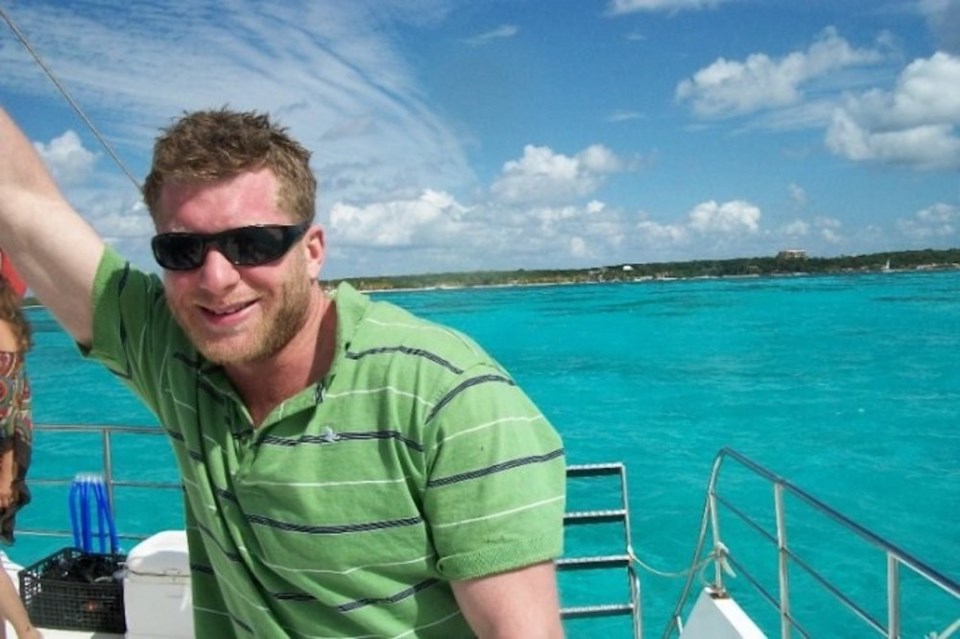More than seven years after his death, a public inquest into the death of Myles Thomas Gray of Sechelt will begin April 17 at 9:30 a.m., said a Jan. 19 announcement from the Ministry of Public Safety and Solicitor General.
At the time of his death, Gray was a 33-year-old businessman from Sechelt. On Aug. 13, 2015, he was making deliveries in Burnaby when the police were called over a dispute about a resident’s water use during that summer’s drought. After multiple Vancouver Police Department officers arrived, they restrained Gray. A post-mortem found bruising and lacerations to Gray’s face, fractures to his nose and orbital bone, a possible partial dislocated jaw, a minor brain bleed, throat cartilage fracture, rib fracture, and bilateral testicular hemorrhage. While unconscious and restrained, Gray went into cardiac arrest. At 4:21 p.m., paramedics pronounced Gray dead at the scene.
His death was reported to the BC Coroners Service by the Vancouver Police Department that day. Despite Gray’s extensive injuries, a post-mortem “could not determine the specific cause of death,” a document included with a Prosecution Service decision states.
The Independent Investigations Office (IIO) determined there was “reasonable grounds to believe the officers may have committed offences. But in December 2020, B.C.’s Prosecution Service announced that no criminal charges were approved against any of the officers involved in the arrest of Gray, in part because the involved officers were the only witnesses. The next day, the Office of the Police Complaint Commissioner (OPCC) announced it will move ahead with its own investigation into the conduct of the Vancouver police officers.
A CBC report published in October 2022 revealed that four of those officers were under investigation at the time of Gray’s death after an incident that left another man with a broken jaw six weeks earlier. One of the four was also charged with assault related to a 2017 arrest, Lindsay reported.
A civil suit filed by Gray’s family has yet to be scheduled for court.
The news of the inquest came as a shock to Margie Gray, Myles’s mother, who said she found out it had been scheduled when she was contacted by a reporter.
Myles’s death has traumatized the family, she said, and the lack of consideration for her family has also been traumatizing. Not being informed that the inquest has been scheduled before it became public knowledge is “just one example of the just zero regard for the family, zero courtesy for the family.”
Margie said she will not be participating in the inquest. She previously attended the inquest into the death of Tony Du, who died after he was shot by an officer with the Vancouver Police Department in 2014, and said she was sick for months afterward.
“I don’t think an inquest is going to solve anything,” Margie said.
“I'm pretty convinced there's going to be no truth being told that day. So what would I gain from being there? Like what would the positive aspects be to go and retraumatize myself listening to so many different accounts of the same story?”
Myles’s sister, Melissa Gray, said, “I don’t think it’s fair for us to be expected to sit through that.”
A media spokesperson for the BC Coroners Service told Coast Reporter that notification of the inquest dates was sent to all legal representatives the day before the media advisory was released, as per usual protocols.
Margie said the Coroners Service didn’t confirm that the family was aware.
“I think Myles deserved a hell of a lot more,” his mother said. “I think he deserved a hell of a lot better treatment from his own country than what he's been dealt. Like this should have never even happened.”
An inquest and an investigation
The presiding coroner Larry Marzinzik and a jury will hear the evidence from witnesses starting on April 17 at the Burnaby Coroners’ Court. A list of the witnesses will be made public in the days before the inquest begins. The inquest can be attended virtually via livestreaming.
An inquest is mandatory for any deaths that occur when someone is detained or in the custody of a police officer. The inquest will seek to determine the facts related to the death (such as how, when, where the death occurred and a classification for the death), make recommendations to prevent deaths in similar circumstances and “to ensure public confidence that the circumstances surrounding the death of an individual will not be overlooked, concealed or ignored," the release said.
The jury does not make conclusions of law or determine legal responsibility, the release said.
An inquest cannot be held while a criminal investigation is under way. The pandemic also created scheduling delays, the media spokesperson for the BC Coroners Office added.
The OPCC’s investigation and the Coroners Service inquest are separate and distinct processes, deputy police complaint commissioner Andrea Spindler with the OPCC, told Coast Reporter via email.
She confirmed officers with the Vancouver Police Department are under investigation by the OPCC. The OPCC anticipates the investigation is nearing completion, and at that time the Discipline Authority will make a preliminary determination whether there is sufficient evidence to begin a disciplinary process. Further processes under the Police Act could take place. The OPCC’s investigation has been “fairly complex” since it involves not only the officers’ use of force, but their actions after the incident, regarding documentation, cooperation and other matters, Spindler wrote.
When asked about cooperation of the officers, Spindler wrote, “unlike investigations completed by the Independent Investigations Office, all respondent members are compellable under the Police Act to provide a statement and answer questions.” She pointed to two previous B.C.cases that determined “a duty to cooperate under the Police Act is absolute.”
With files from Sophie Woodrooffe and Paul Galinski / Powell River Peak



